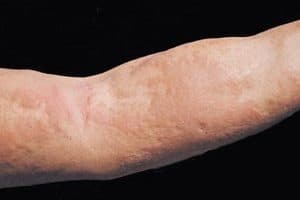
NSF Lawsuits Moving Ahead. Lawsuits filed by people claiming that gadolinium contrast agents caused them to develop Nephrogenic Systemic Fibrosis (NSF) are moving forward in the Multidistrict Litigation in the U.S. District Court for the Northern District of Ohio. Last week, the judge overseeing the litigation established a series of ground rules for the consolidated discovery […]

NSF Lawsuits Moving Ahead. Lawsuits filed by people claiming that gadolinium contrast agents caused them to develop Nephrogenic Systemic Fibrosis (NSF) are moving forward in the Multidistrict Litigation in the U.S. District Court for the Northern District of Ohio. Last week, the judge overseeing the litigation established a series of ground rules for the consolidated discovery phase of hundreds of cases.
NSF is a devastating condition that affects people with pre-existing kidney problems. There is currently no cure for NSF and no one understands its specific cause. The disorder is characterized by high blood pressure, burning, itching, swelling and hardening of the skin.
Other symptoms include red or dark patches on the skin; pain deep in the hip bones or ribs and muscle weakness. NSF can progress to the point of causing severe stiffness in joints, and it can lead to death.
A growing mountain of evidence has linked NSF to gadolinium contrast dyes, and it is theorized that people with kidney problems may not be able to quickly eliminate gadolinium from their body. Dutch scientists made the first connection between NSF and gadolinium in 2006
Researchers at Yale University have reported that 95-percent of those with NSF had undergone a Magnetic Imaging Resonance (MRI) procedure that involved a gadolinium contrast dye two to three months before their symptoms appeared. Since then, several other studies have made similar connections.
Another study at Massachusetts General Hospital also found that kidney patients who had undergone MRIs with gadolinium contrast dyes were 10 times more likely to develop NSF than patient who had not been exposed to such agents.
In September 2007, the Food & Drug Administration (FDA) asked the manufacturers of gadolinium contrast dyes to add a black box warning to the product labels about its association with NSF. The FDA also warned that patients with kidney disease should avoid gadolinium contrast agents.
Since then, hundreds of NSF victims and their families have filed lawsuits in state and federal against the makers of gadolinium contrast dyes for their injuries. In February 2008, the U. S. Judicial Panel on Multidistrict Litigation designated the U.S. District Court for the Northern District of Ohio as the venue for NSF lawsuits pending in federal courts.
The Judicial Panel on Multidistrict Litigation of the United States Courts was created in 1968. Since then, it has consolidated hundreds of thousands of lawsuits that involved high numbers of plaintiffs, including litigation over asbestos, breast implants and other matters.
Multidistrict Litigation is not the same as a class action lawsuit. Each case in a Multidistrict Litigation retains its own identity. If the Multidistrict Litigation process does not resolve the cases, they are transferred back to the court where they originated for trial.
As of September 24, there were 287 NSF lawsuits pending in the Multidistrict Litigation. Another 104 lawsuits have been filed in various state courts throughout the U.S. Gadolinium dye makers Bayer HealthCare Pharmaceuticals, Bracco Diagnostics, GE Healthcare and Mallinckrodt have all been named as defendants in the cases.
For the next Multidistrict Litigation conference, lawyers must provide product identification in approximately 75% of the cases where a plaintiff fact sheet has been exchanged prior to October 1 before the case can be designated for an early trial pool.
Attorneys for both sides must also choose 10 cases each by November to undergo discovery. The 20 cases will be reduced to 10 by May 2009 for the court to begin case-specific expert discovery.
By January 23, plaintiffs must also submit expert reports limited to any generic experts they may call in the initial trials.
The personal injury attorneys at Parker Waichman LLP offer free, no-obligation case evaluations. For more information, fill out our online contact form or call 1-800-YOURLAWYER (1-800-968-7529).


